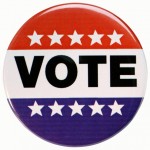 Q: Does the Bible say anything about how Christians should approach political elections? I’ve been thinking about this recently in light of the U.S. presidential election.
Q: Does the Bible say anything about how Christians should approach political elections? I’ve been thinking about this recently in light of the U.S. presidential election.
A: It’s a relevant question not only for U.S. voters, but for anyone living in a country with free elections. Fortunately, Scripture lays out some helpful principles in this regard. First, don’t be apathetic. When God’s people have a say in the selection of governmental leaders, they bear partial responsibility for the policies those leaders enact.
Despite the many differences between modern democracies and Old Testament theocracy, the example of ancient Israel is instructive. In Deuteronomy, Moses explained that the people would play a role in selecting their leaders in the Promised Land: “You shall appoint judges and officers in all your towns that the LORD your God is giving you, according to your tribes, and they shall judge the people with righteous judgment” (16:18). And though God ultimately would select the king, the people were tasked with confirming His selection: “When you come to the land that the LORD your God is giving you, and you possess it and dwell in it and then say, ‘I will set a king over me, like all the nations that are around me,’ you may indeed set a king over you whom the LORD your God will choose” (17:14-15).
Later, when the nation became mired in civic sin, God held the people partly responsible for the corruption of their leaders. Because the leaders were “rebels and companions of thieves” (Isaiah 1:23), the Lord indicted both the rulers and the people (Isaiah 1:10). Again, there are myriad ways in which Old Testament Israel differed from modern democratic states. (For one, our civil governments do not enforce religious orthodoxy.) But a principle remains: when God’s people bear responsibility for selecting their leaders, they bear guilt for wicked policies established by those leaders. It’s a principle every Christian must take seriously when he or she steps into a voting booth.
Yet while we should not be apathetic about elections, neither should we be anxious. Repeatedly, the Bible reminds us that the evil acts of unrighteous leaders can never derail God’s sovereign plan. He makes them unwitting partners in the accomplishment of His will. Though citizens are accountable for their votes, “there is no authority apart from God” (Romans 13:1). Further, “the king’s heart is a stream of water in the hand of the LORD; he turns it wherever he will” (Proverbs 21:1). A case in point was Babylon’s wicked King Nebuchadnezzar. Though he defied the God of Israel and thus bore guilt, the Lord used him to discipline a disobedient nation of Judah. Similarly, God used the wicked king of Assyria to discipline the northern kingdom of Israel and the idolatrous Caesar Augustus to summon Mary and Joseph to Bethlehem for the birth of Jesus. In the same vein, the Lord can and does use every leader today; none can overturn His will.
So when you vote, consider deeply your responsibility to elect a candidate who upholds God’s standards. But if someone wins who opposes those standards, don’t panic. The Lord is still on His throne regardless of who inhabits 1600 Pennsylvania Avenue, 10 Downing Street, or any other seat of power.